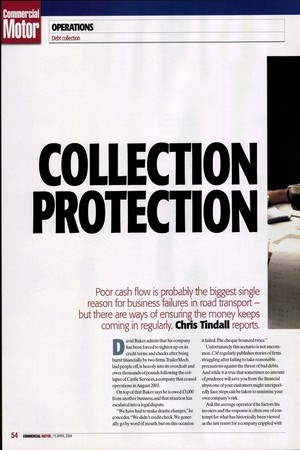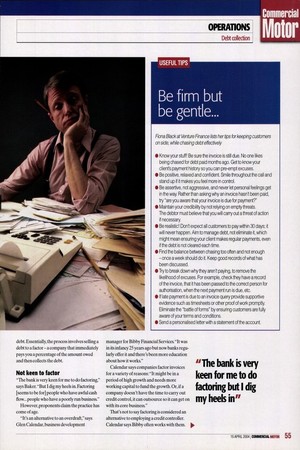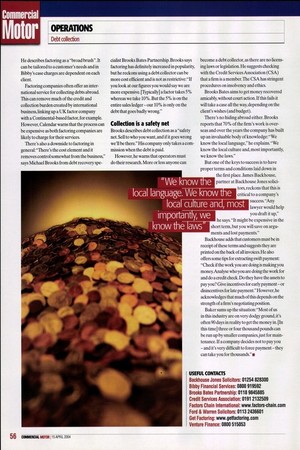COLLECT 1 PROTECT 1 Poor cash flow is probably the
Page 52

Page 53

Page 54

If you've noticed an error in this article please click here to report it so we can fix it.
biggest single reason for business failures in road transport — but there are ways of ensuring the money keeps
coming in regularly. Chris Tindall reports.
David Baker admits that his company has been forced to tighten up on its credit terms and checks after being burnt financially by two firms. TrailerMech laid people off, is heavily into its overdraft and owes thousands of pounds following the collapse of Castle Services, a company that ceased operations in August 2003.
On top of that Baker says he is owed £3,000 from another business, and that situation has escalated into a legal dispute. "We have had to make drastic changes," he concedes. "We didn't credit check. We generally go by word of mouth,but on this occasion
it failed.The cheque bounced twice."
Unfortunately this scenario is not uncommon. CM regularly publishes stories of firms struggling after failing to take reasonable precautions against the threat of bad debts. And while it is true that sometimes no amount of prudence will save you from the financial abyss one of your customers might unexpectedly face, steps can be taken to minimise your own company's risk. Ask the average operator if he factors his invoices and the response is often one of contempt for what has historically been viewed as the last resort for a company crippled with
debt. Essentially, the process involves selling a debt to a factor— a company that immediately pays you a percentage of the amount owed and then collects the debt. Not keen to factor
"The bank is very keen for me to do factoring," says Baker. "But I dig my heels in. Factoring [seems to be for] people who have awful cash flow.., people who have a poorly run business."
However, proponents claim the practice has come of age. "It's an alternative to an overdraft," says Glen Calendar, business development
manager for Bibby Fmancial Services."It was in its infancy 25 years ago but now banks regularly offer it and there's been more education about how it works."
Calendar says companies factor invoices for a variety of reasons: "It might be in a period of high growth and needs more working capital to fund the growth. Or, if a company doesn't have the time to carry out credit control, it can outsource so it can get on with its core business."
That's not to say factoring is considered an alternative to employing a credit controller. Calendar says Bibby often works with them.
He describes factoring as a "broad brush". It can be tailored to a customer's needs and in Bibby's case charges are dependent on each client.
Factoring companies often offer an international service for collecting debts abroad. This can remove much of the credit and collection burden created by international business, linking up a UK factor company with a Continental-based factor, for example. However, Calendar warns that the process can be expensive as both factoring companies are likely to charge for their services. There's also a downside to factoring in general: "There's the cost element and it removes control somewhat from the business," says Michael Brooks from debt recovery spe
cialist Brooks Bates Partnership. Brooks says factoring has definitely increased in popularity, but he reckons using a debt collector can be more cost efficient and is not as restrictive: "If you look at our figures you would say we are more expensive. [Typically] a factor takes 5% whereas we take 10%. But the 5% is on the entire sales ledger— our 10% is only on the debt that goes badly wrong." Collection is a safety net
Brooks describes debt collection as a "safety net. Sell to who you want, and if it goes wrong we'll be there." His company only takes acornmission when the debt is paid. However, he warns that operators must do their research. More or less anyone can
become a debt collector, as there are no licensing laws or legislation. He suggests checking with the Credit Services Association (CSA) that a firm is a member.The CSA has stringent procedures on insolvency and ethics.
Brooks Bates aims to get money recovered amicably, without court action. If this fails it will take a case all the way, depending on the client's wishes (and budget).
There's no hiding abroad either. Brooks reports that 70% of the firm's work is overseas and over the years the company has built up an invaluable body of knowledge:"We know the local language," he explains. "We know the local culture and, most importantly, we know the laws." But one of the keys to success is to have proper terms and conditions laid down in the first place. James Backhouse, partner at Backhouse Jones solici tors, reckons that this is critical to a company's success. "Any lawyer would help you draft it up," he says. "It might be expensive in the
short term, but you will save on arguments and lost payments."
Backhouse adds that customers must be in receipt of these terms and suggests they are printed on the back of all invoices. He also offers some tips for extracting swift payment: "Check if the work you are doing is making you money.Analyse who you are doing the work for and do a credit check. Do they have the assets to pay you? Give incentives for early payment—or disincentives for late payment." However, he acknowledges that much of this depends on the strength of a firm's negotiating position. Baker sums up the situation:"Most of us in this industry are on very dodgy ground, it's often 90 days in reality to get the money in. [In this time] three or four thousand pounds can be run up by smaller companies, just for maintenance. If a company decides not to pay you — and it's very difficult to force payment— they can take you for thousands." •
























































































































































































